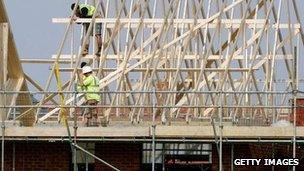Scottish minister Swinney makes 'no more cuts plea' to Chancellor Osborne
- Published

John Swinney said he wanted George Osborne to provide additional capital investment to help recovery
Scotland's finance secretary has written to the UK chancellor calling on him not to make further "damaging" cuts to the country's budget.
The plea by John Swinney comes the day before Chancellor George Osborne delivers his Autumn Statement.
The Scottish minister said that while there were signs of economic growth he wanted to see a new UK approach which would sustain recovery.
A Treasury spokesman said the whole of the UK was on a "path to prosperity".
He added: "The chancellor will set out his Autumn Statement on Thursday, including the next steps in securing the recovery.
"Thanks to the country's hard work, and tough decisions of the UK government, we are now on the path to prosperity.
"The deficit is down by a third, and 1.4 million private sector jobs have been created in the past three years - benefitting Scotland and the whole UK."
However, Mr Swinney said that previous cuts had been "deeply damaging" and represented a failure to respect the system of devolution, under which the Budget is approved by Holyrood.
He explained: "Successive UK Budgets and Autumn Statements have undermined the Scottish government's ability to support economic revival, particularly through the significant cuts the chancellor has made to capital investment over the spending review period and, in some cases, the in-year reductions he has made to the Scottish government's published spending plans.
"The UK government retains the right to take money out of our Budget mid-year and has done so in the past.
"It is not only deeply damaging to our plans for investment and to our public services, such cuts completely fail to respect devolution and I have urged the chancellor to assure me that there will be no such cuts in the future."
Mr Swinney said he had also urged Mr Osborne to provide additional capital investment to help the economy recover.
The UK government was also asked to improve access to finance for small and medium-sized firms and to invest in energy infrastructure to help the renewables sector.
Mr Swinney added: "There remains a need for additional direct capital investment to support recovery, and it is vital to ensure small businesses have access to finance. There is also a need for serious investment in energy infrastructure over the coming years to help deliver renewable generation across Scotland and the UK."
On the issue of renewable energy, the BBC understands the government plans to make changes to the subsidy system.
It is thought UK ministers will announce that they will cut support for onshore wind and solar energy, but give more backing to offshore wind power.
Chief Secretary to the Treasury Danny Alexander described the shift in subsidy as "a rebalancing" and said overall spending would not change.
Basic questions
The people of Scotland take part in a referendum on independence next year. On Thursday, 18 September, they will be asked the straight "yes/no" question: "Should Scotland be an independent country."
SNP minister Mr Swinney said that in an independent Scotland a sustainable economy could be delivered with an effective industrial strategy, "boosting productivity and exports and increasing innovation and participation in the workforce".
But the UK Treasury spokesman said: "While the UK government has a responsible plan for economic recovery, the Scottish government has yet to answer basic questions about the economic consequences of separation. On issues like the proposed currency union and the cost of pensions, there is continued uncertainty.
"The finance secretary's claims on fiscal policy lack credibility. The independent Institute for Fiscal Studies has estimated that in the first year of a separate Scotland there would need to be spending cuts or tax rises of £3.4bn to balance the books. The Scottish government would have to raise tax bills by an average of £1,000 a year per household by the end of the decade."
- Published4 December 2013
- Published3 December 2013
- Published26 November 2013
- Published26 November 2013
- Published26 November 2013